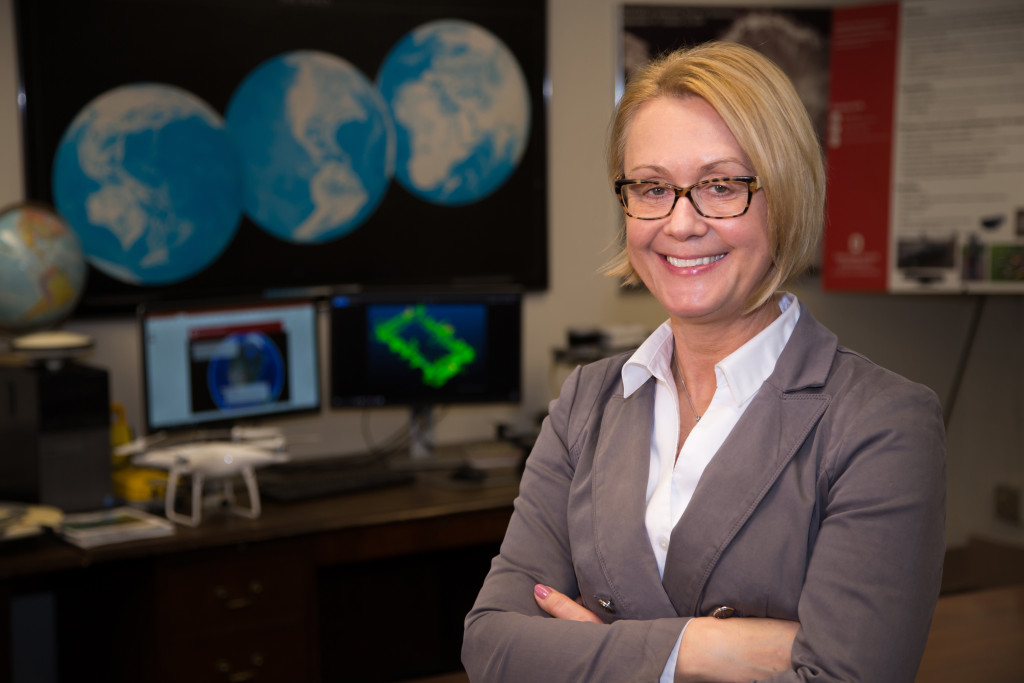Dorota A. Grejner-Brzezinska named UW–Madison vice chancellor for research

Dorota A. Grejner-Brzezinska Photo by Katrina Norris The Ohio State University
Dorota A. Grejner-Brzezinska will serve as the University of Wisconsin–Madison’s vice chancellor for research. Chancellor Jennifer L. Mnookin named Brzezinska, a longtime Ohio State University engineering professor and GPS researcher, to the post today. She begins Sept. 1.
“Wisconsin has so many strong research institutes, departments and colleges,” Brzezinska says. “I am looking forward to the opportunity to build partnerships with them to grow the future-oriented research infrastructure they have developed, blend it with the Wisconsin Idea and bring the institution and state to even higher national and international prominence.”

Dorota A. Grejner-Brzezinska
Brzezinska, the vice president for knowledge enterprise at Ohio State and a professor of civil, environmental and geodetic engineering, has been on campus in Columbus since she began graduate studies in satellite geodesy, the science of measuring and understanding the Earth’s shape and orientation in space, in 1991.
Her tenure includes leadership roles — including department chair, associate dean for research and senior vice president for corporate and government partnerships — focused on growing research talent and research expenditures, building interdisciplinarity connections across campus and helping stand up new research institutes and centers.
“I am tremendously excited for Dr. Brzezinska to step into a position of leadership on our campus,” says Chancellor Jennifer L. Mnookin. “Her expertise developing technology with worldwide impact and her focus on helping other scholars build teams to expand the reach of their own work are perfect attributes for UW–Madison’s vice chancellor for research role.”
Fascinated by maps as a child, Brzezinska collected charts and books about maps and early explorers with her father and marveled at the accuracy early explorers and navigators were able to achieve with the tools of their time.
“They were darn accurate even compared to what the current techniques could do,” she says. “When it came time for me to choose what I wanted to study in college, geomatics engineering — surveying engineering, if you will — was for me. And the timing lined up with this phenomenal new thing called the Global Positioning System.”
But GPS was inaccessible in her native Poland during her studies at the University of Warmia and Mazury, so Ohio State’s labs beckoned. After completing a second master’s degree and a doctorate there, Brzezinska remained as a scientist at NASA’s Ohio State-based Center for Space Development. In 1999, she joined the university’s engineering faculty and has since mentored 16 students to doctoral degrees and secured nearly $39 million in research funding.
Her research initially focused on improving GPS for civilian applications by increasing accuracy and enabling real-time availability.
“GPS has been at the core of my research for years,” says Brzezinska. “It’s an example of a game-changing technological innovation that we now take for granted. The transformation of GPS, a military-only technology, to a portable, global location technology is astounding, and I am thrilled to have been an active player in this transformation.”
One of her research lab’s first accomplishments was developing the first fully digital and directly geo-referenced Airborne Integrated Mapping System, combining high-resolution digital, aerial camera images with GPS and inertial technology. In recent years, her lab has been working on indoor navigation, autonomous navigation and collaborative navigation for accurate wayfinding in environments where GPS signals aren’t available.
President Joe Biden appointed Brzezinska to the National Science Board in 2023, following three years of service on the President’s Council of Advisors on Science and Technology. A fellow of the American Association for the Advancement of Science, Institute of Navigation, and the Royal Institute of Navigation and member of the National Academy of Engineering, she is also the first woman to receive the International Association of the Institutes of Navigation’s John Harrison Award for career achievement.
When she joins the faculty of the Department of Electrical and Computer Engineering, Brzezinska will also bring along the National Science Foundation’s Engineering Research Visioning Alliance, which she leads as principal investigator.
In her role leading Ohio State’s Office of Knowledge Enterprise, the research- and talent-development arm of the university’s Enterprise for Research, Brzezinska has spent three years working on strategic growth and diversification of the university’s research portfolio through federal funding and on helping faculty develop research leadership skills, and map routes that take their work to new heights.
“We developed a host of programs to train research leaders without overloading them,” she says, a model she thinks may also find success at UW–Madison. “We have various programs, boot camps and workshops to help individual faculty and multi-disciplinary teams of faculty grow their impact and leadership portfolios and also put them in position not only to respond to, but also to lead new and large federal funding initiatives.”
While her first order of business will be taking in the broad landscape of UW–Madison’s research enterprise, Brzezinska sees that breadth as a key advantage in competition for leadership of federal research centers that prioritize inter-disciplinary and inter-organizational collaboration.
“Interdisciplinarity, to be effective, requires deep disciplinarity, and that is a phenomenal strength of Wisconsin,” says Brzezinska. “There is a lot of appetite among people I’ve met in Madison to go for the largest opportunities — like National Science Foundation Regional Innovation Engines. That means working together across disciplines and also in partnership with industry and government economic development agencies. Those are the opportunities I would love to work with UW–Madison faculty and leadership on to bring to the state.”
Brzezinska was selected from among three finalists in a search conducted by a 17-member committee chaired by Bill Murphy, professor of biomedical engineering and orthopedics and rehabilitation.
“Dr. Brzezinska’s remarkable scope of accomplishments and deep commitment to interdisciplinarity are a great match for our institution,” says Bill Murphy, “She is an innovative leader with an entrepreneurial mindset and a vision to grow UW–Madison’s standing among the world’s top research institutions.”
Brzezinska will take over for neuroscience professor Cynthia Czajkowski, who has served as interim vice chancellor for research since 2023 and as associate vice chancellor for research in biological sciences since 2018, seeing the office through a reorganization that shifted the Graduate School into the Office of the Provost.
The vice chancellor for research leads one of the largest and most diverse research programs in American higher education. Brzezinska will oversee a portfolio comprising $1.5 billion in annual research expenditures and manage research policy and compliance. She will also oversee the activities of nearly 20 research centers, including the Wisconsin Energy Institute, the Data Science Institute, the Waisman Center and the UW Arboretum.




